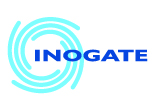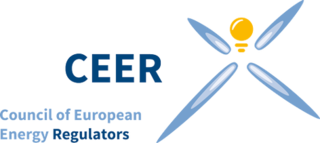Related Research Articles

Energy liberalisation refers to the liberalisation of energy markets, with specific reference to electricity generation markets, by bringing greater competition into electricity and gas markets in the interest of creating more competitive markets and reductions in price by privatisation. As the supply of electricity is a natural monopoly, this entails complex and costly systems of regulation to enforce a system of competition.

The Energy Community, commonly referred to as the Energy Community for South East Europe (ECSEE), is an international organization consisting of the European Union (EU) and a number of non-EU countries. It aims to extend the EU internal energy market to wider Southeast Europe. The members commit to implement relevant EU energy acquis communautaire, to develop an adequate regulatory framework and to liberalize their energy markets in line with the acquis under the founding Treaty.

A transmission system operator (TSO) is an entity entrusted with transporting energy in the form of natural gas or electrical power on a national or regional level, using fixed infrastructure. The term is defined by the European Commission. The certification procedure for transmission system operators is listed in Article 10 of the Electricity and Gas Directives of 2009.
ENTSO-E, the European Network of Transmission System Operators, represents 39 electricity transmission system operators (TSOs) from 35 countries across Europe, thus extending beyond EU borders. ENTSO-E was established and given legal mandates by the EU's Third Package for the Internal energy market in 2009, which aims at further liberalising the gas and electricity markets in the EU.

Directive 2003/30/EC was a European Union directive for promoting the use of biofuels for EU transport. The directive entered into force in May 2003, and stipulated that national measures must be taken by countries across the EU aiming at replacing 5.75% of all transport fossil fuels with biofuels by 2010. The directive also called for an intermediate target of 2% by 31 December 2005. The target of 5.75% was to be met by 31 December 2010. These percentages were to be calculated on the basis of energy content of the fuel and were to apply to petrol and diesel fuel for transport purposes placed on the markets of member states. Member states were encouraged to take on national "indicative" targets in conformity with the overall target.

The energy policy of the European Union focuses on energy security, sustainability, and integrating the energy markets of member states. An increasingly important part of it is climate policy. A key energy policy adopted in 2009 is the 20/20/20 objectives, binding for all EU Member States. The target involved increasing the share of renewable energy in its final energy use to 20%, reduce greenhouse gases by 20% and increase energy efficiency by 20%. After this target was met, new targets for 2030 were set at a 55% reduction of greenhouse gas emissions by 2030 as part of the European Green Deal. After the Russian invasion of Ukraine, the EU's energy policy turned more towards energy security in their REPowerEU policy package, which boosts both renewable deployment and fossil fuel infrastructure for alternative suppliers.

Interstate Oil and Gas Transportation to Europe (INOGATE) was an international energy co-operation programme between the European Union (EU), the littoral states of the Black and Caspian seas and their neighbouring countries. The programme was operational from 1996 to 2016.

The Council of European Energy Regulators (CEER) is a non-profit organization in which Europe's national energy regulators co-operate to protect consumer interests and to facilitate the creation of a single, competitive, and sustainable internal market for gas and electricity in Europe.
The electricity sectors of the Republic of Ireland and Northern Ireland are integrated and supply 2.5 million customers from a combination of coal, peat, natural gas, wind and hydropower. In 2022, 34 TWh were generated. In 2018 natural gas produced 51.8%, while wind turbines generated 28.1%, coal 7%, and peat 6.8% of Ireland's average electricity demand. In 2020 wind turbines generated 36.3% of Ireland's electrical demand, one of the highest wind power proportions in the world. While the United Kingdom was one of the first countries in the world to deploy commercial nuclear power plants, the island of Ireland has never had a nuclear power plant built on either side of the Irish border. Nuclear power in Ireland was discussed in the 1960s and 1970s but ultimately never phased in, with legislation now in place explicitly forbidding its introduction.

The Body of European Regulators for Electronic Communications (BEREC) is the body in which the regulators of the telecommunications markets in the European Union work together. Other participants are the representatives of the European Commission, as well as telecommunication regulators from the member states of the EEA and of states that are in the process of joining the EU.
The European Union Agency for the Cooperation of Energy Regulators (ACER) is an Agency of the European Union created under the terms of the Third Energy Package of 2009. It was established in 2010 and has its seat in Ljubljana, Slovenia.


The European Network of Transmission System Operators for Gas (ENTSOG) is an association of Europe's transmission system operators (TSOs). ENTSOG was created on 1 December 2009 by 31 TSOs from 21 European countries. Creation of the ENTSOG was initiated by the adoption of the European Union third legislative package on the gas and electricity markets. It aims to promote the completion and cross-border trade for gas on the European internal market, and development of the European natural gas transmission network. According to the third energy package ENTSOG is required to develop an EU-wide ten-year gas network development plan.
The European Union's Third Energy Package is a legislative package for an internal gas and electricity market in the European Union. Its purpose is to further open up the gas and electricity markets in the European Union. The package was proposed by the European Commission in September 2007, and adopted by the European Parliament and the Council of the European Union in July 2009. It entered into force on 3 September 2009.

The EuroAsia Interconnector is a HVDC interconnector between the Greek, Cypriot, and Israeli power grids via the world's longest submarine power cable. Connecting Kofinou, Cyprus to Hadera, Israel and Korakias, Crete, Greece the EuroAsia Interconnector is a major Project of Common Interest of the European Union and a priority Electricity Highway Interconnector Project, as an energy highway bridging Asia and Europe. Regulatory approval of electricity interconnection between Cyprus and Greece was completed on October 10, 2017.
Independent Power Transmission Operator S.A. is the Transmission System Operator for the Hellenic Electricity Transmission System. The mission of the company is the operation, control, maintenance and development of the national transmission system of Greece to ensure the reliable and efficient electricity supply, as well as the operation of the electricity market following the principles of transparency and equality.
Regulation on Wholesale Energy Market Integrity and Transparency (REMIT) is an EU regulation designed to increase the transparency and stability of the European energy markets while combating insider trading and market manipulation. REMIT was adopted in the European Union in 2011. Part of the regulation went into immediate effect in all EU member states, with some obligations around registration and transaction reporting only coming into effect once the REMIT Implementing Acts have been passed. The EU agency ACER has been tasked with the supervision and regulation of energy markets in accordance with REMIT.

The Energy Taxation Directive or ETD (2003/96/EC) is a European directive, which establishes the framework conditions of the European Union for the taxation of electricity, motor and aviation fuels and most heating fuels. The directive is part of European Union energy law; its core component is the setting of minimum tax rates for all Member States.